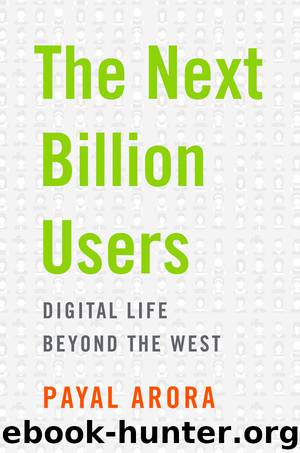The Next Billion Users by Payal Arora

Author:Payal Arora
Language: eng
Format: epub
Publisher: Harvard University Press
This was the ultimate democracy, the founding principle by which educators recognized the individuality of the child over all else, including the will of the teacher. The authority of the teacher was dangerous to the child’s well-being.
As the years passed, this grand theory began to crumble. Children did not view self-governance as freedom but instead saw it as a chore. Apathy set in. Much like other radicals and progressives of their generation, the Russells wanted to believe that children were innately benevolent and egoless. In practice, they found that the children were often driven by self-interest and needed to be taught to rein in their needs for the good of the group. They found that given a choice, a child would rather climb a tree than do math. Human nature got in the way of a beautiful theory. Bertrand Russell admitted in his autobiography that he had been mistaken in a number of his beliefs, particularly regarding the role of unstructured play and self-governance in education. He had come to recognize that children did need a certain amount of guidance, order, and routine, and that “left to amuse themselves, they are bored and turn to bullying or destruction.”15 In 1943, Beacon Hill was forced to close after years of financial difficulties and low enrollment.
This did not stop later intellectuals from reviving this idea and in fact expanding the claims for self-directed learning, especially when it came to the poor. In 1971, Ivan Illich called for the dismantling of schools. He framed schooling as a powerful institution that reproduces social hierarchies. The traditional school, Illich argued, is geared toward teaching the poor to subsume themselves to the social system that works to the advantage of the elites. The poor should break these chains and free themselves from such indoctrination. Poverty is a “loss of personal potency,” and the only way to rise from this state of helplessness is to reclaim control over one’s learning.16
To make his point, Illich quoted Fidel Castro’s declaration that universities could be abolished, that life itself is an educational experience. Decades before social media, Illich advocated for new technology to serve as a pathway for personalized “learning webs.” He envisioned peer networks to support all activity that individuals deemed valuable. He believed in the power of technology to create new institutions that would allow the poor to be autonomous, creative, and at last independent of the trappings of social oppression.17
Not surprisingly, Illich was a friend of the Brazilian educator Paulo Freire, who became world-renowned for his critical pedagogy movement. The bible of this movement, Freire’s book Pedagogy of the Oppressed (1969), created a major stir in Brazil and beyond. It became so controversial that Freire was forced into exile. Freire compared the Brazilian educational system to a banking model that deposited information into the minds of the poor. The only way for the poor to rise against this was to become cognizant of their oppressors and conscious of the oppression that surrounded them. He argued that a peasant could teach his neighbor more effectively than could a teacher brought in from the city.
Download
This site does not store any files on its server. We only index and link to content provided by other sites. Please contact the content providers to delete copyright contents if any and email us, we'll remove relevant links or contents immediately.
Cecilia; Or, Memoirs of an Heiress — Volume 1 by Fanny Burney(32558)
The Great Music City by Andrea Baker(32018)
Cecilia; Or, Memoirs of an Heiress — Volume 2 by Fanny Burney(31956)
Cecilia; Or, Memoirs of an Heiress — Volume 3 by Fanny Burney(31941)
We're Going to Need More Wine by Gabrielle Union(19046)
All the Missing Girls by Megan Miranda(16023)
Pimp by Iceberg Slim(14506)
For the Love of Europe by Rick Steves(14121)
Bombshells: Glamour Girls of a Lifetime by Sullivan Steve(14073)
Talking to Strangers by Malcolm Gladwell(13370)
Norse Mythology by Gaiman Neil(13363)
Fifty Shades Freed by E L James(13239)
Mindhunter: Inside the FBI's Elite Serial Crime Unit by John E. Douglas & Mark Olshaker(9339)
Crazy Rich Asians by Kevin Kwan(9290)
The Lost Art of Listening by Michael P. Nichols(7506)
Enlightenment Now: The Case for Reason, Science, Humanism, and Progress by Steven Pinker(7311)
The Four Agreements by Don Miguel Ruiz(6765)
Bad Blood by John Carreyrou(6621)
Weapons of Math Destruction by Cathy O'Neil(6279)
